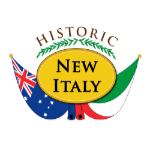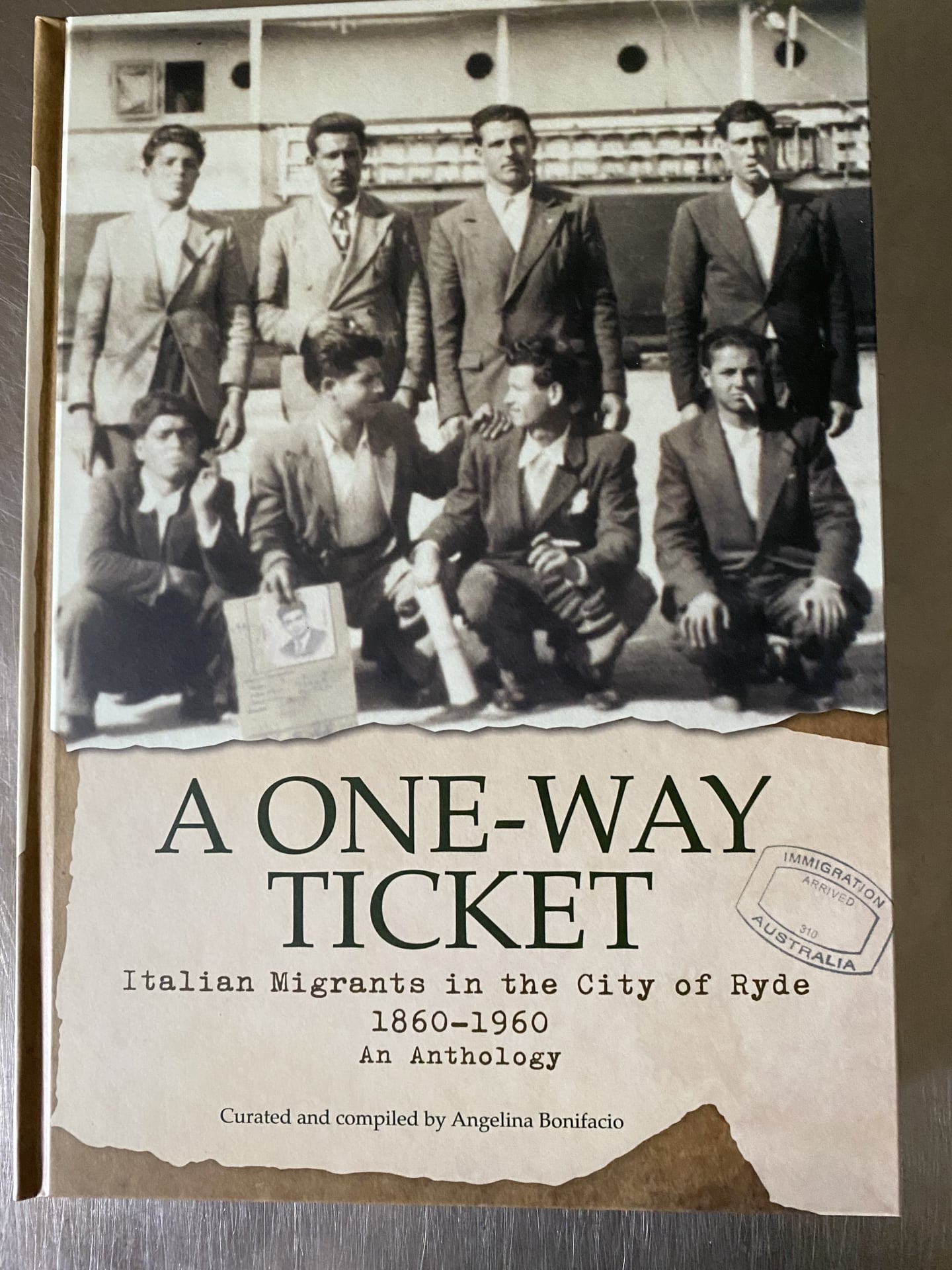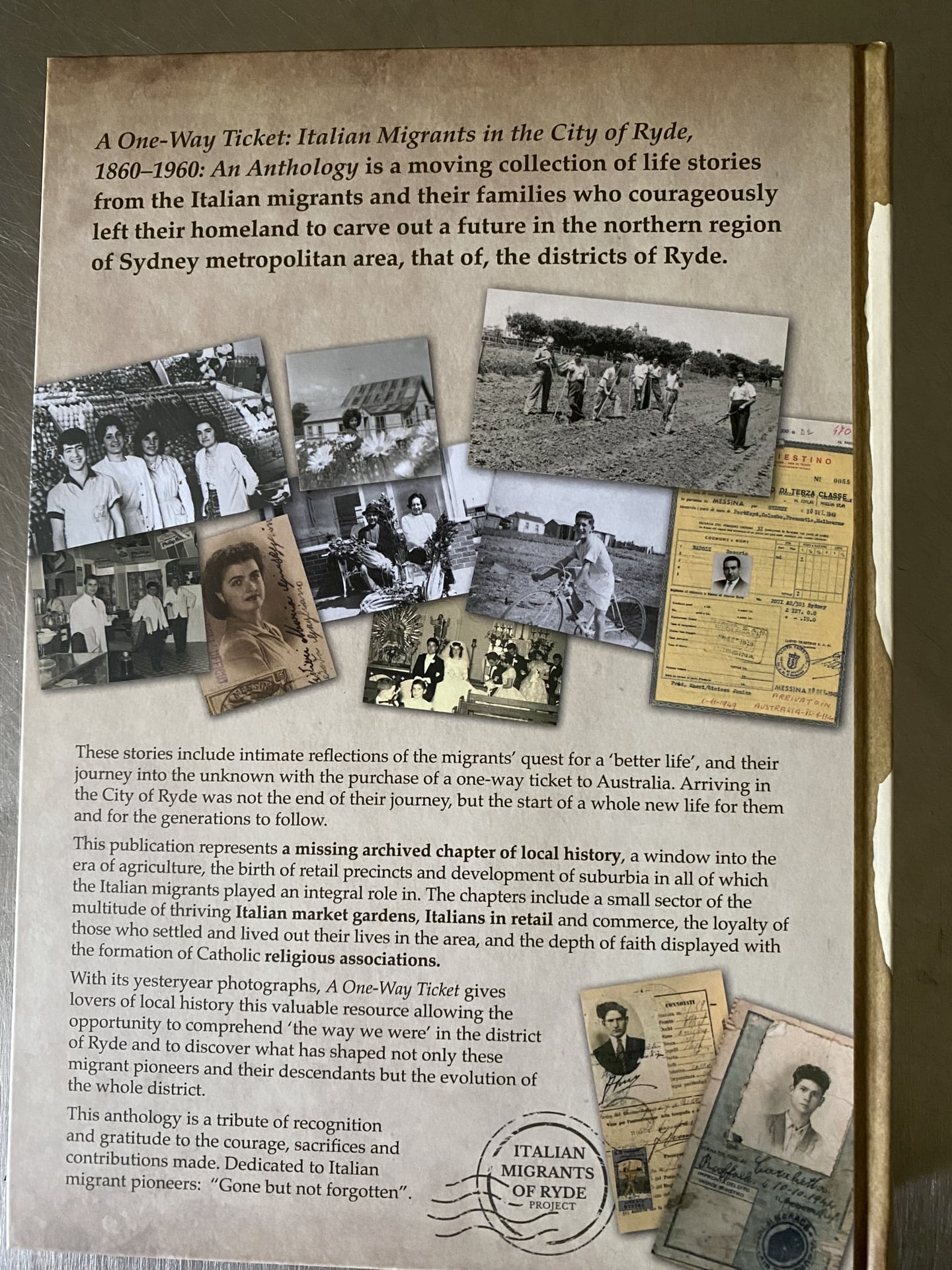A One-way Ticket by Angelina Bonifacio
A One-Way Ticket: Italian Migrants in the City of Ryde, 1860-1960: An Anthology is a moving collection of life stories from the Italian migrants and their families who courageously left their homeland to carve out a future in the northern region of Sydney metropolitan area, that of, the districts of Ryde.
Foreword by The Honourable Victor Michael Dominello
NSW MINISTER FOR CUSTOMER SERVICE AND DIGITAL GOVERNMENT, MEMBER FOR RYDE, 2020-2022
For family and friends this book is a visceral awakening of memories. For students and historians it’s a valuable resource. For people who have a connection with Ryde, it’s an important ingredient for understanding the strength of our diversity. For migrants of non-Italian heritage, it’s an empathetic adhesive.
In his Dialogo sopra i due massimi sistemi del mondo (1632), astronomer and polymath Galileo Galilei famously said:
Tutte le verità sono facili da capire una volta che sono state rivelate. Il difficile é scoprirle. (All truths are easy to understand once they are discovered. What is difficult is to discover them.)
Many of the ‘truths’ about the Italian migrants’ contribution to Ryde have been confined to photos and memories that live within family units. Precious in every sense of the word. They are of great emotional value for the families. Equally, they are of significant value to our collective history, particularly here in the City of Ryde.
History ends unless it’s recorded. If recorded, then it will resonate in eternity. We have an obligation to preserve the memories of those who sacrificed so much to give us a better opportunity in this great southern land.
Unless documented, it’s easy to forget what our forefathers and mothers sacrificed and went through.
When these migrants packed up to travel halfway around the world, it would have been akin to a one-way trip to the moon. This took profound courage. There was no guarantee they would succeed in Australia and thus be able to afford a return ticket to Italy to visit family. In the early days the main communication channel was snail mail.
This progressed over time to very expensive and crackly telephone calls. It is almost impossible to truly understand the grief of not being able to seamlessly communicate with your loved ones. No one could have envisaged today’s world of emails and Face Time.
Today we live in comparative 21st-century luxury. The first Italian immigrants to the Ryde districts predominantly worked the land. Many were market gardeners. They worked so hard as a family. In the sun. In the cold. In the rain. There was no sun safety to be had nor UV protection.
It was difficult but necessary elemental work. In time many migrants established corner shops, greengrocers, barber shops, tailoring businesses and other forms of enterprise.
They laid a solid foundation for the generations to follow.
The enduring feature of that foundation was strength of character.
I have a very strong and personal connection to these foundations. My grandparents migrated to Ryde pre-and post-World War II. My paternal grandparents set up a market garden in North Ryde and then a greengrocer in Eastwood. My maternal grandparents also settled in Ryde, behind the old Civic Centre. Like many others they worked in factories around Meadowbank and Ryde – Hoover and Delta come to mind. I, together with my mother and other family members, continue to live in the districts of Ryde.
Thankfully, many families still have photos and detailed accounts of those early years. Most of these photos are stored away in old boxes that, realistically, rarely see the light of day. These old photos are delicate and can fade with time. They can be lost when people move home or even be destroyed in natural disasters.
Our collective history must be recorded. For it contains too many precious memories and within them important life lessons. This anthology reveals the Italian migrant history of human experiences in the soil of Ryde.
We all remember with deep fondness so many traditions continued that are centred around food – the making of tomato passata, fresh pasta, salami, bread – and who can forget making wine. Personally, I believe that for many people of Italian heritage, preparing, cooking and sharing a meal is an expression of love.
The great aspect of many of these traditions was that they were on a production scale. Everyone was involved; parents, grandparents, kids, cousins. Everyone was allocated a task. Each year you might get promoted to a more senior role. For the rare few, there was an accelerated promotion pathway.
It was so much fun. Great food that would satisfy your appetite until the next meal. Greater still are the memories that nourish our soul in our human expression.
That’s why this book is so important. It does more than record history. For many it evokes great experiences. No one can remember everything; however, a page, a photo or even just a sentence in this anthology may help someone to reconnect with a powerful chapter of their life. More powerfully, it may encourage others to continue the rich traditions of our pioneering forebears.
My heartfelt thanks and gratitude to Angelina Carabetta Bonifacio, second generation Italian migrant descendant, residing her entire life in the districts of Ryde, with her family in its fifth generation. Angelina is the Founder of the Italian Migrant Project and Chairperson of the Italian Migrants of Ryde Committee. She was passionate to document the Italian history chapter of the City of Ryde before it was lost and/or too hard to trace. She has been supported by the Italian Migrant Committee members and the Italian community.


